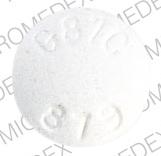Aspirin/codeine and Alcohol/Food Interactions
There is 1 alcohol/food/lifestyle interaction with aspirin / codeine.
Codeine Food/Lifestyle
Major Food Interaction
GENERALLY AVOID: Alcohol may potentiate the central nervous system (CNS) depressant effects of opioid analgesics. Concomitant use may result in additive CNS depression and impairment of judgment, thinking, and psychomotor skills. In more severe cases, hypotension, respiratory depression, profound sedation, coma, or even death may occur. In addition, alcohol may affect opioid release from sustained-release formulations.
GENERALLY AVOID: Grapefruit or grapefruit juice may increase the plasma concentrations of opioid analgesics by inhibiting CYP450 3A4-mediated metabolism of these agents, although the interaction has not been studied. In general, the effect of grapefruit juice is concentration-, dose- and preparation-dependent, and can vary widely among brands. Certain preparations of grapefruit juice (e.g., high dose, double strength) have sometimes demonstrated potent inhibition of CYP450 3A4, while other preparations (e.g., low dose, single strength) have typically demonstrated moderate inhibition. Pharmacokinetic interactions involving grapefruit juice are also subject to a high degree of interpatient variability, thus the extent to which a given patient may be affected is difficult to predict.
MANAGEMENT: Patients should not consume alcoholic beverages or use drug products that contain alcohol during treatment with opioid analgesics. Any history of alcohol or illicit drug use should be considered when prescribing an opioid analgesic, and therapy initiated at a lower dosage if necessary. Patients should be closely monitored for signs and symptoms of sedation, respiratory depression, and hypotension. Due to a high degree of interpatient variability with respect to grapefruit juice interactions, patients treated with opioid analgesics should preferably avoid the consumption of grapefruit and grapefruit juice.
References (18)
- (2017) "Product Information. Alfentanil Hydrochloride (alfentanil)." Akorn Inc
- (2024) "Product Information. TraMADol Hydrochloride (traMADol)." Advagen Pharma Ltd
- (2024) "Product Information. Jamp Tramadol (tramadol)." Jamp Pharma Corporation
- (2025) "Product Information. Tramadol (tramadol)." Sigma Pharmaceuticals Plc
- (2024) "Product Information. Tramedo (tRAMadol)." Alphapharm Pty Ltd
- (2022) "Product Information. Alfentanil (alfentanil)." Hameln Pharma Ltd
- (2024) "Product Information. Butorphanol Tartrate (butorphanol)." Apotex Corporation
- (2024) "Product Information. Codeine Sulfate (codeine)." Lannett Company Inc
- (2024) "Product Information. Meperidine Hydrochloride (meperidine)." Genus Lifesciences Inc.
- (2023) "Product Information. Dsuvia (SUFentanil)." AcelRx Pharmaceuticals
- (2024) "Product Information. Dzuveo (sufentanil)." Aguettant Ltd
- (2025) "Product Information. Pethidine (pethidine)." Martindale Pharmaceuticals Ltd
- (2023) "Product Information. Meperidine Hydrochloride (meperidine)." Sandoz Canada Incorporated
- (2024) "Product Information. Pethidine (Juno) (pethidine)." Juno Pharmaceuticals Pty Ltd
- Cherrier MM, Shen DD, Shireman L, et al. (2021) "Elevated customary alcohol consumption attenuates opioid effects." Pharmacol Biochem Behav, 4, p. 1-27
- Fuhr LM, Marok FZ, Fuhr U, Selzer D, Lehr T (2023) "Physiologically based pharmacokinetic modeling of bergamottin and 6,7-dihydroxybergamottin to describe CYP3A4 mediated grapefruit-drug interactions." Clin Pharmacol Ther, 114, p. 470-82
- (2025) "Product Information. TraMADol Hydrochloride ER (traMADol)." Trigen Laboratories Inc
- (2025) "Product Information. Codeine Contin (codeine)." Purdue Pharma
Switch to consumer interaction data
Aspirin/codeine drug interactions
There are 790 drug interactions with aspirin / codeine.
Aspirin/codeine disease interactions
There are 25 disease interactions with aspirin / codeine which include:
- coagulation
- impaired GI motility
- infectious diarrhea
- prematurity
- asthma
- acute alcohol intoxication
- drug dependence
- hypotension
- intracranial pressure
- respiratory depression
- gastrointestinal obstruction
- GI toxicity
- renal dysfunction
- Reye's syndrome
- adrenal insufficiency
- liver disease
- renal dysfunction
- seizure disorders
- urinary retention
- arrhythmias
- biliary tract disease
- anemia
- dialysis
- G-6-PD deficiency
- hepatotoxicity
More about aspirin / codeine
- Check interactions
- Compare alternatives
- Drug images
- Side effects
- Dosage information
- During pregnancy
- Drug class: narcotic analgesic combinations
Related treatment guides
Drug Interaction Classification
| Highly clinically significant. Avoid combinations; the risk of the interaction outweighs the benefit. | |
| Moderately clinically significant. Usually avoid combinations; use it only under special circumstances. | |
| Minimally clinically significant. Minimize risk; assess risk and consider an alternative drug, take steps to circumvent the interaction risk and/or institute a monitoring plan. | |
| No interaction information available. |
See also:
Further information
Always consult your healthcare provider to ensure the information displayed on this page applies to your personal circumstances.


